Why I Play: Marc Chiang, Goalball
"Why I Play” is a weekly column every Wednesday showcasing the stories of people who enjoy playing sports in Singapore. Want to see your sport featured? Let us know via Facebook, Twitter or email.
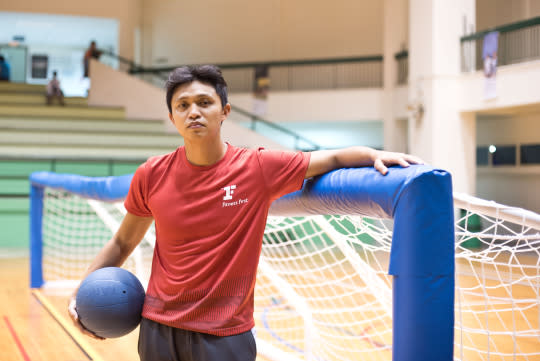
Marc Chiang, 36, plays in the Singapore national goalball men’s team and participated in last year’s ASEAN Para Games (APG). The national team captain, who can only see with about five percent of his vision, now trains regularly with the national team as they prepare for the next APG in Malaysia in 2017.
They have weekly practice at Delta Sports Complex on Tuesdays and weight training on Fridays at Raffles Quay’s Fitness First.
Goalball is played with three players in each team defending a goal that is nine-metre wide and 1.3 metres in height. The ball used in the game is the size of a basketball but weighs about twice as much and contains bells inside. All the players also wear black masks to ensure that none of the players can see. The bells help the players to detect where the ball is.
How did you get involved in this sport?
I was introduced to this game by one of my friends from the running club called Runninghour. So I went down to Singapore Association for the Visually Handicapped (SAPH) to play the sport. At that time, it was a concrete court, but now we’ve moved on to having a proper court with actual goalposts and everything.
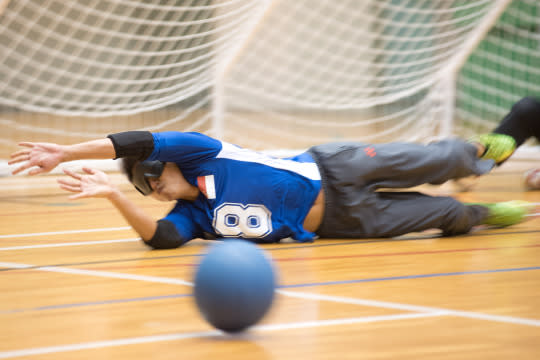
What kind of a workout do you get from playing this sport?
For this, it’s a total body workout, not only do you have your upper body, you have your core muscles, your legs and cardio as well. So at Fitness First, they provide us the different machines to work on different parts of our body.
We work a lot on our chest; we have the chest press, as well as our legs; we use the leg press machines. For the cardio side, because of our visual impairment, it’s actually safer that we use the cycling machines rather than the running treadmill. But some of us actually know how, being quite experienced in running, we do use the treadmill as well.
Biggest misconceptions people have of this sport?
One of the biggest misconceptions is that it looks like a rather easy game because you see us just lying down and blocking the ball, just throwing the ball... but when you’re in the game, because the ball is travelling very fast, we have to be very reactive.
It’s not just about muscle gain to throw the ball, but it’s also about having the agility and the reaction because we rely on our hearing to play the game. Sometimes you have the crowd distracting you or even your opponents and everybody distracting you. And you have to be very stable and focused.
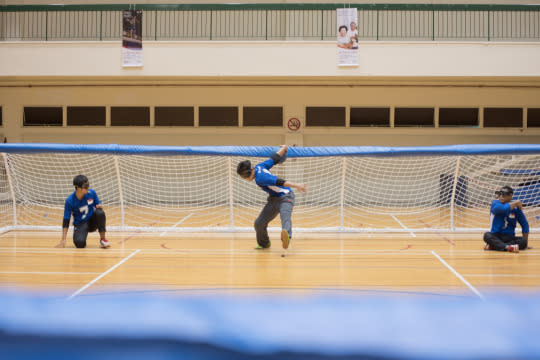
This is also one of the games that promotes teamwork among the visually impaired. So it really builds on the teamwork because a three man team has to work together not just defend but to attack the goal as well.
In playing this sport, what’s been your most memorable experience?
We represented Singapore during the last year’s APG. That was something very memorable for all of us.
Your most heartbreaking?
I would say that it was the girls’ game whereby they lost by just two goals or three goals to Myanmar. Clearly we went in there as the underdogs because the opponents easily had three years ahead of us.
But some of us have only up to six months of training. And there we are, competing even against Thailand, who are playing at an international level, not just at the regional level. So it’s very much a learning experience for every one of us.
That was the girls’ game. The guys’ game was heartbreaking, every game (laughs).
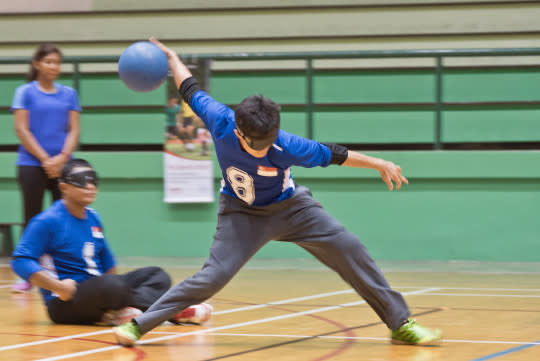
Share an inspiring story you have of a tournament or an experience with teammates that made you love this sport even more.
Some of them when they started to play the game are not that independent. But through sports, they actually learn how to be a little bit more independent, whether it is travelling, whether it is being focused during training, or being able to go to the toilet themselves. Like being independent when they go to the games village (during APG) – it’s no longer having your parents around to take care of you. I can see how different people have grown over this one year period as we’ve started training together.
Was there a time you felt like walking away from the sport? What made you stay?
I think there are times, especially as we started closing towards the games, it was really hard to balance between work as well as trainings. Trainings increased from two to three times, and to four times during the last few months, which was really rather hectic and tiring, especially when it’s after your work.
And I think some of them they have to juggle between school and the game. I think one of our fellow players, she was also having exams during the games period. So everybody really sacrificed quite a bit during that period.
But I guess playing for our country is not an everyday thing that you get to do. Especially when playing in front of the home crowd, I think that is something that really pushed us to train harder, train harder, and to train harder. To be able to play well during the games itself. Stay on, you know, pull it through.
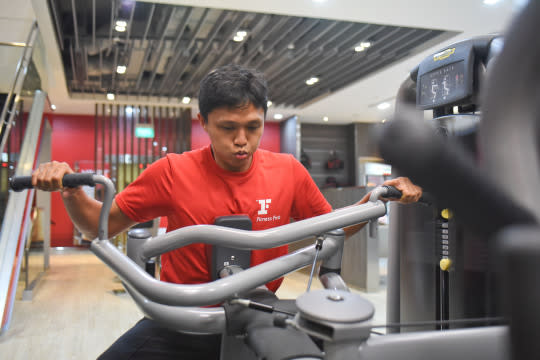
What life lessons has this sport taught you?
The thing about this game is that we pick up a lot of skills during this game. The coach has always been there to remind us like to practice what he calls the 3Rs – recognise, regroup, and refocus. When you translate it to your life, you’re able to apply it when you’re working, when you’re studying, when you’re constantly being distracted… that’s when you practice your 3Rs. Refocus on what you’re supposed to be doing. These life skills are transferable, not just for the game.
Every time during the game, whether it is the penalty or whether it is a goal scored during the gameplay, when the crowd shouts for us, I think that was really the happiest moment or most inspiring moment for us to try to play even harder. Because sometimes when we’re really tired out there, and you know you’re still lagging behind, the fighting spirit is always there. It’s still there, we don’t give up until the whistle blows.
How can people get involved if they’re interested in this sport?
So for athletes or newcomers who want to join, you are most welcome to join us once a week at Delta Sports Hall. They can contact Singapore Disability Sports Council and look for Amal. You’re most welcome to join us anytime.
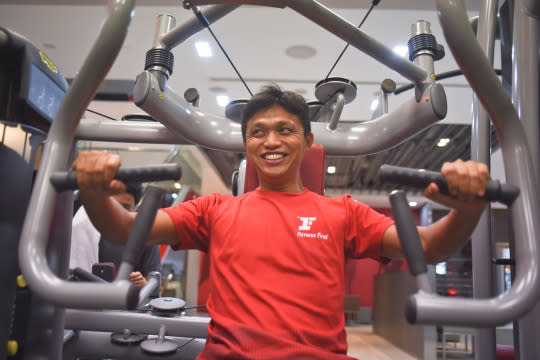
My sport is unique because... it’s the only team sport for the visually impaired that caters to all level of visual impairment and played competitively at the Paralympic level.

